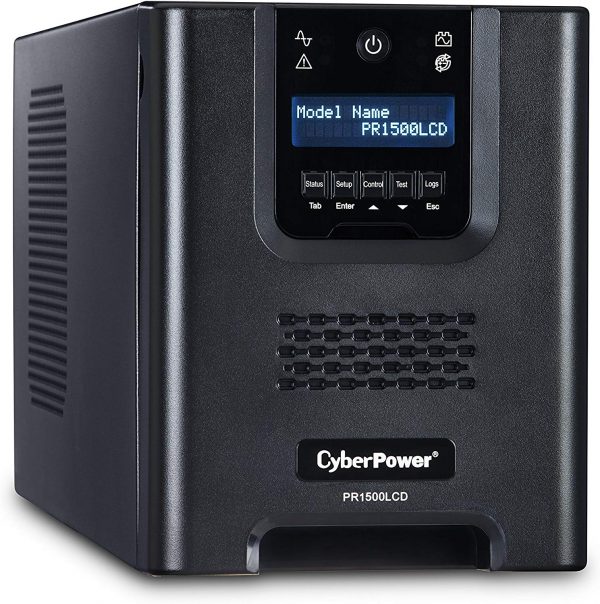An uninterruptible power supply (UPS) is a device that provides backup power to connected equipment in the event of a power failure or disturbance. A surge protector is a device that protects connected equipment from voltage spikes and transient surges. While both devices are important for protecting equipment, they serve different purposes.
A UPS is designed to provide temporary backup power to connected equipment in the event of a power outage. It does this by storing electrical energy in batteries which can be used to power equipment when the main power supply fails. UPS devices come in different sizes and capacities and can power anything from a single computer to an entire data center.
UPS devices also protect equipment from power disturbances such as voltage sags, spikes, and brownouts. These disturbances can cause damage to sensitive electronics, leading to data loss, equipment failure, and downtime. A UPS can help prevent these problems by providing a stable source of power during these disturbances.
A surge protector, on the other hand, is designed to protect equipment from sudden voltage spikes and transient surges. These surges can be caused by lightning strikes, power outages, and other electrical disturbances. Surge protectors work by diverting excess voltage away from connected equipment and into the ground.
While surge protectors are an important part of any electrical system, they should not be relied upon as the sole means of protection. A UPS provides a higher level of protection by providing backup power and regulating voltage during disturbances. Combining a UPS with a surge protector provides the best possible protection for connected equipment.
It is important to note that surge protectors have a limited lifespan and should be replaced every few years. This is because the components inside the surge protector can wear out over time, reducing their effectiveness. A UPS also has a limited lifespan, typically around 3-5 years, and should be replaced when it is no longer able to provide backup power.
A UPS surge protector is an important part of any electrical system. It provides backup power and protection from power disturbances, ensuring that connected equipment remains safe and functional. Regular maintenance and replacement of these devices is essential to ensure the highest level of protection for your equipment.

Does a UPS Serve as a Surge Protector?
A UPS, or Uninterruptible Power Supply, is a device designed to provide backup power in case of a power outage. While a UPS can provide some level of protection against surges, it is not designed to be a primary surge protection device. In other words, a UPS can help protect your equipment from power surges, but it is not the best or most effective way to do so.
A surge protector, on the other hand, is specifically designed to protect your equipment from power surges. It works by diverting excess voltage away from your equipment and into the ground, where it cannot cause any damage.
That being said, a UPS can still provide some level of surge protection. However, if you want to ensure that your equipment is fully protected against power surges, it is recommended that you invest in a dedicated surge protector in addition to a UPS. This will provide you with double protection and help ensure that your equipment remains safe and operational.
Comparing UPS and Surge Protectors
UPS is better than a surge protector. While both devices serve the purpose of protecting your electronic devices from power surges, a UPS provides additional benefits that a surge protector does not offer. Here are some of the reasons why UPS is considered better:
1. Uninterrupted Power Supply: A UPS provides temporary backup power during a power outage, which is not possible with a surge protector. This is especially important for devices that need to be constantly powered, such as servers, medical equipment, and security systems.
2. Battery Backup: A UPS comes with a built-in battery that can provide power to your devices for a limited time. This helps prevent data loss and damage to your device during a power outage.
3. Voltage Regulation: A UPS can regulate the voltage of the power supply to your device, which is not possible with a surge protector. This helps prevent damage to your device from voltage fluctuations.
4. Protection from Power Fluctuations: A UPS provides protection against power fluctuations, such as brownouts and blackouts. This is important for devices that are sensitive to power fluctuations, such as computers and networking equipment.
5. Longevity of Devices: A UPS helps extend the life of your electronic devices by providing clean and stable power. This reduces the risk of damage due to power surges, voltage fluctuations, and power outages.
While a surge protector is a good starting point to protect your devices from power surges, a UPS provides additional benefits such as uninterrupted power supply, battery backup, voltage regulation, protection from power fluctuations, and longevity of devices.
The lifespan of a UPS Surge Protector
A UPS surge protector typically has a lifespan of three to five years. However, if your area experiences frequent voltage fluctuations, brownouts, or blackouts, you might need to replace your surge protectors more frequently, perhaps every two years. It is important to note that surge protectors are not designed to last forever and should be replaced periodically to ensure they are providing the necessary protection to your electronic devices. Keeping a regular check on the condition of your surge protectors is crucial to safeguarding your valuable appliances from power surges and spikes.
Understanding the Benefits of UPS Power Surge Protection
UPS power surge refers to a sudden increase in electrical voltage that can potentially damage electronic devices, such as computers, televisions, and other sensitive equipment. This surge can be caused by a variety of factors, including lightning strikes, power outages, and electrical grid fluctuations. A UPS unit serves to protect against power surges by providing a battery backup system that kicks in when the regular power source fails. This allows the equipment to continue running without interruption and prevents damage caused by power surges. Additionally, a surge protector can be used in conjunction with a UPS to provide an added layer of protection against power surges. Surge protectors work by absorbing the excess voltage and redirecting it away from the connected devices. a UPS and surge protector can help ensure the longevity and reliability of electronic equipment by safeguarding against power surges.
Conclusion
Both surge protectors and uninterruptible power supplies (UPS) play a crucial role in protecting our electronic devices from power fluctuations and outages. While surge protectors provide an initial level of protection against surges, they should not be considered a primary means of protection. On the other hand, UPS devices offer a more comprehensive solution by providing backup power during an outage and regulating voltage levels to prevent damage to connected equipment. It is important to note that surge protectors have a limited lifespan and should be replaced every three to five years, or more frequently if your home experiences frequent power disruptions. Investing in a high-quality surge protector or UPS can provide peace of mind and protect your valuable electronics from damage.








